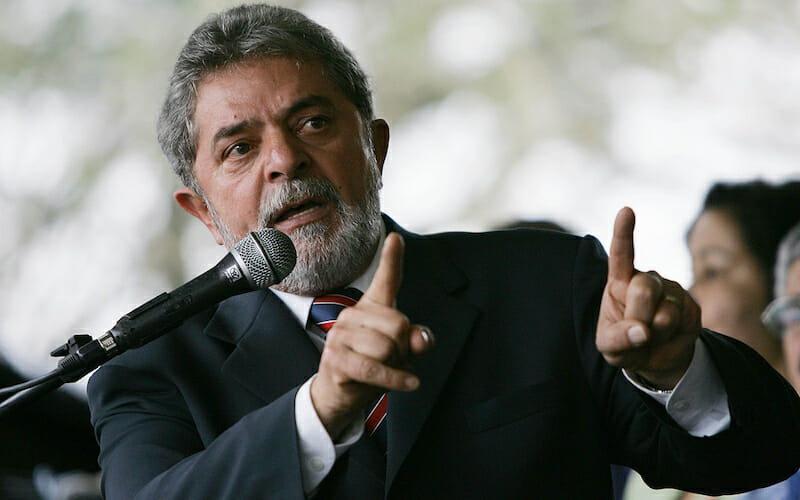
Profiting the 1 Percent in Latin America: How Corruption Deters Development
On Saturday, April 7th, Lula da Silva, Brazil’s former president, turned himself in to begin serving a 12-year sentence for corruption and money laundering. His arrest may have shaken the country because of his popularity and prominence as a politician, but Lula – as he is known by many – is just one of the nearly three hundred members of government and the private sector implicated in one of the biggest corruption scandals in history.
In March 2014, the Federal Police of Brazil launched a money laundering investigation that would be later known as Operation Car Wash (Lava Jato). It centered on executives of Petrobras, Brazil’s state-controlled petroleum company, who reportedly received bribes from construction companies in return for contracts at inflated prices.
The investigation quickly expanded into a web of bribes that spread all over Latin America. It is estimated that between 2004 and 2014, nearly $8 billion was laundered by this criminal network.
Operation Car Wash provides a near perfect textbook definition of corruption. As stated by Transparency International, corruption is defined as “the abuse of entrusted power for private gain.”
Corruption is known to be one of the core distorters of effective development. It eliminates opportunities or possibilities for development because it causes decisions to be made based on a private profit motive instead of the real needs of a country. According to John Clammer, it leads to crime, inefficiencies in bureaucracies, misappropriation of funds, failure to alleviate poverty, and a lack of access to healthcare and education.
Countries with high levels of corruption are characterized by a small middle class and significant economic divergence between upper and lower classes. Wealth and opportunities are concentrated on the top 1 percent of society. Yachts and mansions are prioritized over the most basic human needs, such as access to health care and education.
As long as policymakers in Latin America keep abusing power for private gain, inequality and poverty in the region will persist.
Corruption scandals undermine citizens’ trust in their governments and denote the deterioration of transparency and good governance. Investigations into corruption lack dynamism and objectivity. Public prosecutors are vulnerable to subornation from those in power.
A huge problem in developing countries stems from excessive bureaucratic obstacles, otherwise known as red tape. Many public institutions in Latin America are inefficient due to irrelevant, outdated, and excessive paperwork and procedures. These needless regulations hinder the development of the private sector and may breed corruptive behavior.
The non-productivity of governmental institutions, due to bureaucratic obstacles highlighted above, has been linked to corruption and negative social and economic effects. Regionally, Transparency International found that two key institutions – the police and elected politicians – were perceived by Latin Americans as the most corrupt.
The paying of bribes to access basic services, such as public health care and education, has become part of the culture of many countries in the region. In Brazil, Rodrigo-Caldeira argues that the financial benefits of receiving bribes is what makes it so difficult to put an end to corruption.
In a statement to Financial Times, Paulo Sotero, director of the Brazil Institute of the Woodrow Wilson International Center for Scholars, said of Brazilian politics: “It is a corruptocracy. It’s completely self-serving, it has nothing to do with the interests of the country.”
About 186 million Latin Americans live in poverty. But this extreme inequality that characterizes the region is not inevitable, it is man-made. It is corruption that allows wealth to be concentrated in the hands of a few. It is governments and businesses that are responsible for slowing down socioeconomic development.
And there is no country where this is more evident than in Brazil. Instead of devoting funds to social and economic development in poor areas, corruption leads Brazilian politicians and businessmen and women to make decisions on their own financial interests.
In order to promote social development, Latin American countries must establish anti-corruption laws and independent court systems. Auditing agencies must operate transparently, but are oftentimes co-opted by special interests. Full disclosure of government finances should be available to the public to ensure natural resources are used in the country’s interest.
Latin American governments must devote more of their budgets to building and staffing public schools and ensuring they are efficiently administered. Education may help underprivileged children get jobs, support their families, and escape poverty.
If moral reasoning does not incite policymakers to invest in public education, statistics might do so: expanding access to education is estimated to boost GDP by 28 percent in lower-income countries and 16 percent in higher-income countries.
Better health also contributes to economic progress. According to the World Health Organization, a healthy society lives longer, is more productive, and saves more. In order to decrease bribes for health services, governments must strengthen health policies by allocating funds to infrastructure, research, training, and apportioning higher wages to medical professionals.
According to the US Department of Justice, the following bribes were paid by Brazilian construction company Odebrecht, in millions: $10.5 in Mexico, $18 in Guatemala, $59 in Panama, $92 in Dominican Republic, $98 in Venezuela, $11 in Colombia, $33.5 in Ecuador, $29 in Peru, $35 in Argentina, and $349 in Brazil. In some countries, the actual bribery may be much higher.
Corruption distracts decision-making from the real needs of the country towards the interests of particular groups or people in power. Continuing down this path will cement Latin America’s position as the most unequal region in the world. Millions of people will continue to live without access to basic needs. The rich – living in their bubble – will get richer. Their wealth will not only continue to buy them yachts and mansions, but elections, impunity from justice, and favorable laws.

